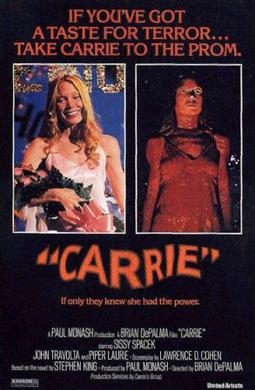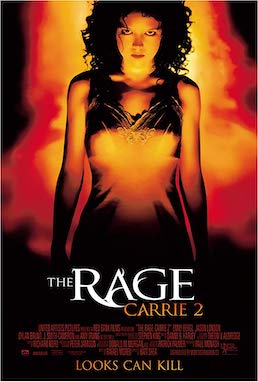‘Salem’s Lot (1975)
Originally to be titled
Second Coming (before Tabby convinced him that sounded too much like a bad sex story, showing that
some women, Misty, are dirtier than I), then
Jerusalem's Lot in full (before someone in the publishing company convinced him that sounded too religious),
'Salem's Lot shows King already in an altogether different place than the last time around. I honestly don’t know what happened, but there’s this unexpected and striking jump in quality between the debut and the sophomore work that cannot be reasonably explained in any way (unless we propose some kind of "Paul-is-dead-" lookalike theory). If I may give you some advice, just like with SymphX and DT: completely disregard the first entry. I mean it. Reading this book reminded me what actually made me go through with this project, right at the point where
Carrie and its stupid adaptations almost made me forget that near the very beginning.
This time around King decided to do a modern vampire story. I'm sure by then the theme had been already exhausted and percieved as cliché, let alone now, taking into consideration not only this very book, but everything it inspired (as far as the "vampires in a modern small town" is concerned, even including that kinda' 50's throwback feel, 1985's
Fright Night -
https://en.wikipedia.org/wiki/Fright_Night - is obviously taking inspiration from
Salem and is quite good on its own, IIRC) as well as Anne Rice and her Lestats,
Interviews, Queens of the Damned, Marvel's Morbius, Blades,
Underworlds,
True Bloods and, of course,
Twilights, it's rather hard to cheer beforehand and have great expectations. I mean, let the fucking vampires be, right? The last time the theme was really fresh was nearly a century ago and since then we've been only sucking the residual life force out of it even further, so to speak. All the more interesting then that King actually managed to handle it very well , not making his reader feel ashamed for the author, nor bored; when he uses clichés, he admits it outright, but does not stoop to being annoying about it and winking at the reader all the time in a perpetual chain of references like some kind of "hip" post-modern shlock like
True Blood does.
The parallel between the dying small American town and the physical death/damnation of its residents, while heavy-handed, was cool and it was one of the things that made the book quite interesting, IMHO. And I guess it's not just an American thing, it's probably the Western world in general. I was born and raised in a city with a population of nearly 80.000, which already looked like Pripyat on weekends and I know enough small towns where indeed you'd might not even notice if a vampire invasion was in progress, just like here. The loss or downright destruction of cultural and social connections, especially among families and parishes, is probably only
worse nowadays than it was in 1975. And that's the truly scary message of the book.
On the other hand, because King tackles this issue, it tends to show his writing abilities were not yet fully mature. As I've mentioned above, the theme
is a bit explicit and heavy-handed at times (he'd soon learn to be more subtle, though
The Stand, amazing as it is, still has this problem a bit) and probably the worst thing about the book is the pacing. Not because I'd complain about the length or anything, it's just that the tempo of the narrative is weird - there is this long, thorough build-up where nothing happens (which is actually important for the theme I mentioned above), but then everything sort of happens at once and then you have this catharsis that's again way too long. The confrontation with Barlow comes way too soon or the epilogue is too prolonged or I don't know. I just felt alternatively that the book is really slow and again rushing too much and it threw me off balance at times.
Despite my criticism below I was actually quite fond of Father Callahan - not only because this book seems to put forth the proposition that you gotta “have Catholic” to fight vampires/evil in general (flattering though as it may be), but because this take on a disillusioned, graying, slightly lost priest was something I really could feel in my heart. I have
always, even earlier as an atheist, had a soft spot for priests in general and the uneasy task they are faced with. A lot of my prayers and charity money go to priests in missions and - knowing a handful of them myself - I always appreciate when the story is told from their point of view. It was awesome in
Calvary, it was awesome in
I Confess, it was doubly awesome in
Silence and while maybe slightly less awesome, it moved me here anyway.
The romance between Ben and Sue was very believable and its resolution was pretty heartbreaking. Actually, I liked most of the characters. They were all very fleshed out - a no mean feat for a starting writer in a book where the number of named characters exceeds 20.
But also, because one of the main characters is a Catholic priest, of course there’s some theology bullshit, so let's look at that:
- The crosses and crucifixes. Obviously, in this book a mere cross is enough to ward off the vampires; you don’t need a crucifix (the one with Christ on it) to work. This is proven by the fact that two tongue depressors put together work as a provisional do-it-yourself weapon against the bad guys. Yet when they ask other people whether they have a cross with them, they all answer something like “I’m not a Catholic” or some other shit. Does it mean King thinks baptists etc. don’t wear/use crosses? That’s bullshit. Most Protestants would object to the crucifix in particular (because it depicts Christ, i.e. God, i.e. idolatry - which, by the way, the use of crosses here smells of anyway, but I digress), but I see no reason why having a plain cross by yourself would be a specifically Catholic thing to do.
- I'm not sure what to make of Callahan's beliefs. On one hand, he sounds pretty much like a product of his era - a post-Vatican II priest in a rural setting with crisis in both faith and (possibly) vocation, that makes his thoughts on the origin and the nature of evil very understandable. On the other hand, I really don't see why his bishop is not taking care of him some more. Though it's true that Maine is one huge diocese and like they used to say in Russia "God is high above and the tsar is far away", so I guess that's plausible too. Still - while realistic - something felt iffy about that and I'm not really sure why, just wanted to mention it.
- I’m on the fence regarding that pseudo-confession stuff. I mean, I don’t even want to begin to try and figure out how this one would work (a Catholic sacrament of Penance handed out to people who are explicitly not Catholic - well, whatever works for the book, I guess), but then again the people in question were probably baptised in the Trinitary fashion (Father-Son-Holy Spirit - none of them is JW, for example), so it’s neither here nor there. A rather non-orthodox thing to do, but done by a rather non-orthodox priest and probably acceptable in the whole general narrative. Someone else might not even notice.
- Much worse (and I mean
much worse) is when they find Straker hanged upside down. Then the
Catholic priest Callahan (doubting or not, he must have had
some education) drops this bomb: „It’s as old as Macedonia [...] Hanging the body of your enemy or betrayer upside down so his head faces earth instead of heaven. St Paul was crucified that way, on an X-shaped cross with his legs broken.“ That's bollocks. First of all, we do not really know for sure what happened to St. Paul - there are several theories and/or reports, most of them presuming he was decapitated (more on that here:
https://en.wikipedia.org/wiki/Paul_the_Apostle#Death ), but none really truly confirming he was crucified
at all, let alone upside down. The bloke who was crucified upside down was
St. Peter and it was
not because it was some kind of special treatment for traitors, but because he
asked for it - he felt he was not worthy of being killed in the same manner as the Messiah had been (I'm not kidding - that's why the upside-down cross is called the Cross of St. Peter:
https://en.wikipedia.org/wiki/Cross_of_Saint_Peter - that's why we have it in Vatican, in case you once again came across some Evangelical fundie who's gonna have "proof that the Catholic Church is SATANIC", like here:
http://www.jesus-is-savior.com/False Religions/Roman Catholicism/satanism_in_the_vatican.htm - BTW that makes its use by "Satanists" rather funny, but I digress again). Yeah, I know, Callahan is a doubting priest from the bush and I get that - I really wouldn't take that so seriously if we were talking about some obscure saint nobody really knows about. But we're talking about two blokes, one who wrote half of New Testament and another one who was the very first
Pope.
- But the single biggest offender here is the scene where Callahan's cross stop working against Barlow and the latter says this: „There is no need of it. You have forgotten the doctrine of your own church, is it not so? The cross… the bread and wine… the confessional… only symbols. Without faith, the cross is only wood, the bread baked wheat, the wine sour grapes.“ Yeah, this is
not a Catholic doctrine, absolutely not. In fact, it’s pretty much the opposite. I guess he’s confusing sacraments and sacramentals there. Just as with the other sacraments, it doesn’t matter whether you believe it or not, according to the Catholic doctrine the bread becomes the Body and the wine becomes the Blood (they “transsubstantiate” - more on this here:
https://en.wikipedia.org/wiki/Transubstantiation ) by following steps of the liturgy - these are the “visible signs of invisible Divine grace”, or “efficacious signs of grace perceptible to the senses”. Now, I’m not talking about unorthodox beliefs of a single character - this is supposedly the belief of the Church. Considering Tabby is allegedly (raised?) Catholic, this took me by surprise. That said, keep in mind it is
the villain - the vampire who says this, so maybe I’m making too big a deal out of this.
- On the other hand, I actually like that aforementioned scene otherwise - disregard what the vampire is saying and what actually happens there seems to be a rather good lesson on the correct use of sacramentals - e.g. don’t expect the cross to work if you don’t believe (or worse - don’t
know) in what it represents.
This time I wrote down the following
musical references. Yup, it’s a bit rednecky, but then again, I guess that fits the overall setting...




 However, sometimes the updates might be a while apart. I'll try to keep 'em comin', though.
However, sometimes the updates might be a while apart. I'll try to keep 'em comin', though.
